News
Electricity tariff: Speaker Abbas to sponsor bill for compulsory NASS, stakeholders consultation

Electricity tariff: Speaker Abbas to sponsor bill for compulsory NASS, stakeholders consultation
..says critical problems in power sector, value chain must be addressed
By Gloria Ikibah
The Speaker of the House of Representatives, Hon. Abbas Tajudeen, has announced plans by him to propose a law that would make it mandatory for the relevant Federal Government bodies to consult the National Assembly and other stakeholders before fixing Electricity tariff.
“Accordingly, I will sponsor a bill to provide administrative procedures that entrench proper consultation and legislative review of process for tariff setting in Nigeria’s electricity and other public services,” he said while declaring open a power sector stakeholders interactive dialogue/workshop organised by the House Committee on Power.
The event was themed: ‘Confronting Nigeria’s Power Challenge as the Nation Migrates to a Multi-Tier Electricity Market: A Legislative Intervention.’
The intervention by the Speaker is coming at a time when Nigerians are criticising the recent electricity tariff increment.
The Nigerian Electricity Regulatory Commission had earlier in April approved an increase in electricity tariff for customers under the Band A classification, with the customers paying N225 kilowatt per hour, up from N66.
Band A customers are those who enjoy not less than 20 hours of electricity supply daily. They represent 15 per cent of the 12 million electricity customers in the country.
The Speaker said he would have expected that the forum and extensive consultations would have preceded the implementation of the new multi-tier electricity system.
“Having this consultation now appears to be an afterthought and goes contrary to the Electricity Act, 2024, which mandates consultation with all relevant stakeholders in determining just and fair tariffs,” he stated.
Speaker Abbas cited Section 33 of the Electricity Act 2024 as establishing the National Electricity Regulatory Commission (NERC) as a public agency subject to the oversight responsibility of the National Assembly under Sections 80-88 of the Constitution.
He stated that Section 34 of the Act specifically empowers the NERC ‘to ensure that the prices charged by the licensee are fair to consumers and are sufficient to allow licensees to finance their activities and to allow for reasonable profit for efficient operation’ and to ‘ensure that regulation is fair and balanced for customers, licensee, investors and other stakeholders.’
Speaker Abbas said: “I hope this forum allows all stakeholders to interrogate whether the new system meets the criteria outlined in the Act.
“The fundamental principles of just and fair pricing of electricity as laid out by a leading authority in this field are (1) simplicity, (2) understandability, (3) acceptability, (4) non-controversial, (5) stability, and (6) non-discriminatory. The question before you today is whether the new tariff model meets these principles.
“In framing the way forward, we can look towards best practices and successful models from other countries that have implemented similar market structures. Notable strategies include strong regulatory oversight to ensure fairness and transparency across all tiers.”
The Speaker stressed the need to address the problems bedevilling the power sector and electricity value chain in Nigeria.
Speaker Abbas also stated that the House’s commitment to “transforming the power sector into a model of efficiency and sustainability is unwavering.”
He said despite the challenges, together as stakeholders, a reformed power sector that drives national growth and enhances the quality of life for all Nigerians is achievable.
Speaker Abbas noted that discussions at the forum were set against the backdrop of the significant challenges and remarkable opportunities within our power sector.
He said: “The government’s objective is clear – to foster a resilient, efficient, and sustainable power sector capable of supporting our nation’s ambitious economic and developmental goals.
“Historically, the Nigerian power sector has grappled with challenges that have stifled its growth and hampered its efficiency. These challenges include inadequate generation capacity, dilapidated infrastructure, frequent disruptions in power supply, and financial inefficiencies that have eroded the sector’s viability.
“Moreover, the inadequate metering and the consequent revenue losses have perpetuated a cycle of debt and underinvestment that has undermined the sector’s potential.”
The Speaker said as the nation navigates these challenges, the stakeholders must foster collaborative efforts that leverage both public and private sector expertise and resources. “This dialogue embodies such collaboration and is crucial in charting a forward path,” he said.
Speaker Abbas also said the shift towards a multi-tier electricity market represents a strategic pivot in our approach to power sector reform. He added that this model envisaged a structured market segmentation that allows for differential pricing and service levels tailored to diverse consumer needs and capacities.
He stressed that it promised enhanced efficiency through competitive practices, encouraged investment by delineating clear market segments, and improved reliability and service delivery across the board.
The Speaker noted: “However, this is just one side of the coin. Despite the much-touted benefits, the transition to a multi-tier market is challenging. These include regulatory complexities, the need for substantial capital investment, the risk of market segmentation leading to disparities in service quality, and resistance from different stakeholder groups due to changes in tariff structures.
“We must acknowledge that numerous stakeholders and industry experts have expressed concerns that the proposed increase in electricity tariffs could lead to significantly higher utility bills. This increase could reduce disposable income for consumers, escalate operational costs for businesses, and increase the prices of goods and services, disproportionately affecting low-income earners in Nigeria. Some experts argue that these changes might drive more individuals into poverty, especially as inflation and foreign exchange issues continue to strain households and businesses.
“Additionally, critical problems within the electricity value chain need to be addressed. Technical and commercial losses, which have not been effectively tackled, add inefficiencies that consumers are indirectly forced to cover, contributing to the cost recovery efforts. These losses amount to billions of naira.”
Speaker Abbas commended the government under President Bola Ahmed Tinubu, GCFR, for its “unwavering commitment and robust drive towards overhauling the power sector.”
He recalled that the first bill to be signed into law by the President, barely a few weeks after his inauguration, was the Electricity Act (Amendment) Bill, 2024, which authorised states, companies, and individuals to generate, transmit and distribute electricity. He noted that the law repealed the Electric Power Sector Reform Act (EPSRA) signed by President Olusegun Obasanjo in 2005.
The Speaker also commended Chairman of the House Committee on Power, Hon. Victor Nwokolo, and members of the committee for their relentless commitment and leadership in spearheading the legislative framework that supports the transformative agenda of the President.
“This is in line with our Legislative Agenda, which prioritises economic growth and transformation of key sectors of the economy, especially power,” he said.
At the event were Minister of Power, Chief Adebayo Adelabu, and heads of agencies under the ministry; former Minister of Power and Chairman of Geometric Power Ltd., Prof Bartholomew Nnaji; former Minister of Information and National Orientation, Prof. Jerry Gana; Group Managing Director of Sahara Group, Kola Adesina; Generating Companies (GenCos), Distribution Companies (DisCos), among others stakeholders.
News
Alleged Terrorism: Judge to issue hearing notice on Nnamdi Kanu case
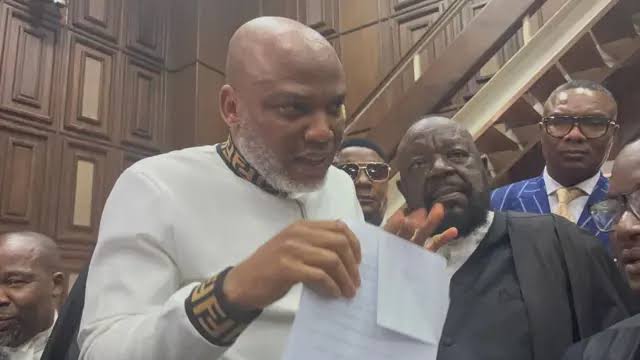
The new judge of the Federal High Court in Abuja who is to handle the treason trial of self-acclaimed leader of proscribed Indigenous People of Biafra (IPOB), Nnamdi Kanu, may issue hearing notices to the parties in the case before the week runs out.
The Nation learnt that the case has now been re-assigned by the Chief Judge of the court, Justice John Tsoho, from Justice Binta Nyako to Justice James Omotosho.
It was not clear last night if the case file had been transmitted to the new judge’s court.
Hearing notices and other relevant information could only be communicated to the parties after the new court would have received the case file, a source told our correspondent.
Also, the court’s Chief Registrar, Sulaiman Hassan, has faulted reports that the new judge, to whom Kanu’s trial has been assigned, has withdrawn from handling it.
In a statement yesterday, Hassan described the report as false and misleading.
The statement reads: “The court unequivocally refutes the false and misleading report, alleging that the Honourable the Chief Judge, the Hon. Justice John T. Tsoho, has stepped down from Nnamdi Kanu’s case and made statements regarding the legality of his arrest.
“This claim is entirely unfounded, fictitious, grossly mischievous, damaging in intent and should be disregarded in its entirety.
“The true position is that the Honourable Justice Tsoho, in his capacity as the Chief Judge, has reassigned Nnamdi Kanu’s case from Honourable Justice Binta Nyako to another (‘new’) judge.
“The report referred to is, therefore, totally spurious.
“The defence team should hence prepare to receive instructions regarding the case, as may be issued by the new judge.
“The Federal High Court strongly cautions against deliberate misinformation to mislead the public and erode confidence in the judicial system.
“We urge the general public to be wary and rely only on verified information from official court sources.
“The court remains steadfast in upholding justice through due process of the law.
“Any further enquiries should be directed to the court’s Information Department.”
News
Terrorism: ECOWAS activates 5,000-strong Standby Force

The Economic Community of West African States (ECOWAS) has activated its Standby Force to curb terrorism and other transborder crimes in the sub-region.
Minister of Defence, Mohammed Badaru, announced this during the 43rd ordinary meeting of the ECOWAS Committee of the Chiefs of Defence in Abuja yesterday.
The meeting was attended by Chiefs of Defence Staff of ECOWAS member countries except Mali, Burkina Faso and Niger, which had withdrawn from the sub-regional body.
Others at the meeting were the ECOWAS Commissioner for Political Affairs Peace and Security, Dr. Abdel-Fatau Musah; Nigeria’s Chief of Defence Staff (CDS), General Christopher Musa; Chief of Army Staff, Lt.-Gen. Olufemi Oluyede; Chief of Naval Staff, Emmanuel Ogalla; Chief of Air Staff, Air Marshal Hasan Abubakar; Chief of Defence Intelligence, Emmanuel Undiandeye; the Inspector General of Police, Kayode Egbetokun, and members of the diplomatic community.
Badaru said the meeting underscored their shared commitment to addressing the critical security challenges confronting the sub-region.
He called on the West African Chiefs of Defence Staff to close ranks to break the cycle of terrorism and armed violence confronting the region.
According to Badaru, by leveraging their collective expertise, resources and commitment, they can make a tangible impact on fostering peace, stability and prosperity in the sub-region.
“In this regard, I am pleased to announce the activation of the ECOWAS Standby Force to combat terrorism in the sub-region,” Badaru said.
“The activation of this force underscores our collective determination to confront the stretch of terrorism with regard to the security of the subregion.
“We must as a sub-region therefore recognise that our strife towards economic growth and development will invariably be fundamental to a home-grown sustainable peace and security.
“We as stakeholders in the sub-region must identify and strictly adjust to the changing order of the global landscape in which emerging threats of terrorism, organised crime, climate change, cybercrime and pandemics respond with respect to our parties.”
ECOWAS Commissioner, Political Affairs, Peace and Security, Dr. Abdel-Fatau Musah, said despite the recent withdrawal of three African countries, the ECOWAS maintains the free movement of persons and goods.
He said: “On 29 January 2025, Mali, Burkina Faso, and Niger formally withdrew their memberships from ECOWAS.
“Following the directives of the Authority of Heads of State and Government at the last Summit in December 2024, the ECOWAS Commission has now initiated a contingency plan to mitigate the unforeseen consequences of their withdrawal.
“I so wish to stress that ECOWAS still has its doors open to welcome back our brothers and sisters from the countries that recently withdrew from our community.
“In this regards, ECOWAS committee of heads of state has directed that despite the withdrawal, ECOWAS must maintain the free movement of people and goods and the rights of settlement and establishment to all citizens of our community, including those from Burkina Faso, Mali and Niger in the spirit of where ECOWAS is going, that is, building a community and a united force of people and we do not want the ordinary citizens of our member states to suffer.”
Musah said the pledges made by the member states were being reconfigured in compliance with the directive to activate the Standby Force in the kinetic mode.
Egbetokun commended the ECOWAS defence forces for playing critical roles in stabilising the region.
“Our collective efforts to enhance regional security, counter transnational threats and promote defence cooperation will no doubt yield possible outcomes for our nation and our people,” he said.
News
Tinubu to Fubara: comply fully with S’Court verdict
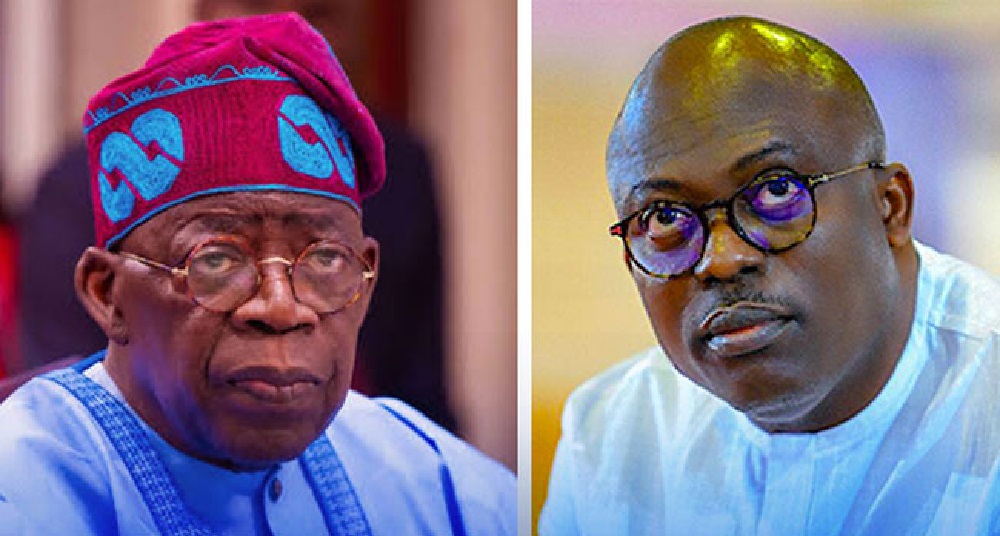
Governor Siminalayi Fubara must comply fully and immediately with the judgment of the Supreme Court to keep the peace in Rivers State, the President declared yesterday.
According to him, the nation is governed by the rule of law without which there will be no order or governance.
President Bola Ahmed Tinubu spoke during a meeting with the delegation of the Pan-Niger Delta Forum (PANDEF) at Aso Villa.
Speaking specifically on the request by the group for intervention in the political logjam, the President put the issue directly on the lap of Fubara.
He said: “Please go back home and help him implement those recommendations within the shortest possible time. I put the ball back in your court. Help him because, privately and openly, I intervened and counselled the governor.
“Only yesterday (Monday), I told him again to pursue the path of peace and stoop to conquer.
“This is a nation governed by the rule of law. I should not be here as the President of the Federal Republic of Nigeria if there was no rule of law. I have total confidence in our judiciary.
“Human beings can make errors, but when the Supreme Court has spoken, that’s it.”
Before the apex court judgment, President Tinubu intervened and got the parties in the crisis to reach an agreement. But it was observed in the breach.
Fubara and his supporters claimed that the agreement was skewed against them.
Since the March 7 apex court judgment, apart from asking council chairmen whose election was declared invalid to vacate office, Fubara has repeatedly promised to comply.
The President further said: “We reached an agreement, a written agreement, and both parties signed. Some leaders thought the governor was wrong to have signed it and didn’t implement it. Where did we find ourselves today?
“I’ve given the situation enough time, enough thinking, enough consideration. We cannot falter, we will not.
“The people of Rivers State must not suffer for the democracy that we all pulled together. They will not, they must be protected. I assure you, we’ll do better.”
Yesterday in Port Harcourt, the governor again promised to implement the judgment.
The House of Assembly led by Martins Amaewhule remained active as it had been since the judgment.
It met with the Niger Delta Development Commission (NDDC) top officials.
The PANDEF big delegation was led by the body’s joint Board of Trustees (BoT) co-chairmen Amanyanabo of Twon-Brass, King Alfred Diete-Spiff, and former Akwa Ibom State Governor Obong Victor Attah.
Also in the delegation was PANDEF chairman Ambassador Godknows Igali.
The President assured the PANDEF leaders of the completion of ongoing projects of his Administration in the Southsouth region.
He said: “Send somebody to go look at what’s going on with the coastal road (Lagos/Calabar). That’s a huge economy and the opportunities associated with it.
“Yes, we’re working with internationally reputable companies to make Uyo Port, Calabar Port, and other Southsouth ports a reality.
“We’re resetting the economy, and it’s tilted far better now. There’s funding for our children in universities, our medical colleges are well-equipped.
“Yes, there’s an infrastructure deficit in some areas, but we will fix it. We’re setting our priorities right.
“With our youthful population, we can achieve the greatest things in Africa. Let us not look at the past wastes, let us learn lessons from it and move forward with this country.
“Whatever remains in these memos that you’ve submitted, I will take a look at them. We’ll meet more regularly.
“Go back home and take charge of peace, and if you need me, let me know.”
The President urged the leaders to support young leaders making strides in community development, citing the work of Dr. Samuel Ogbuku, Managing Director of NDDC.
“Ogbuku, the MD of NDDC, is doing a very good job. Encourage him to achieve more,” President Tinubu said.
King Alfred Papapreye Diete-Spiff thanked the President for his commitment to Southsouth well-being and appointments given to Niger Delta indigenes.
“Your government has taken the bull by the horns, and we are sure you will succeed. We are here to give you our assurance and support. God bless Nigeria and your government,” he said.
Obong Attah called for further intervention in the Rivers crises.
Attah, who also chairs the reconciliation committee set up by PANDEF in Rivers, said the political crisis threatens national stability and deserves more attention.
“Instability there has far-reaching consequences on the peace and stability of the nation,” he added.
He praised the President’s reforms, including power devolution and regional development recognition, and urged focus on infrastructure, seaports, environmental sustainability, and fiscal federalism.
On the delegation were politicians, top government officials, traditional rulers, and senior figures from the zone.
These include many known supporters of Fubara. Among them are: Former Peoples Democratic Party (PDP ) chairman Uche Secondus, former Rivers State Deputy Governor Tele Ikuru; and Prof. Mike Ozakhome (SAN).
Other are: former Cross River State governor, Mr Liyel Imoke; Senator Seriake Dickson; former NDDC Managing Director Timi Alaibe; Jaja of Opobo, Prof. Dandeson Jaja; Senator Ita Enang; Senator Bassey Henshaw; Mrs Ibim Semenitari; Senator Andrew Uchendu; National Coordinator of Host Communities of Nigeria, HOSTCOM, Okareme Maikpobi; Niger Delta activist, Ms Ann-Kio Briggs; spokesman of PANDEF, Chief Obiwevbi Ominimini.
Also in attendance were the Minister of Aviation and Aerospace Development, Festus Keyamo (SAN) and Minister of State for Petroleum (Oil), Senator Heineken Lokpobiri.
-
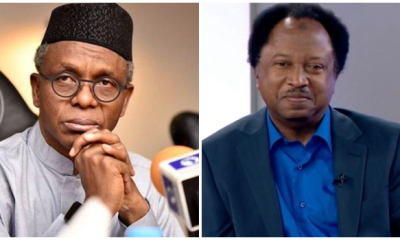
 News24 hours ago
News24 hours agoEl-Rufai Was A Political Liability, His Defection Of No Relevance- Shehu Sani
-
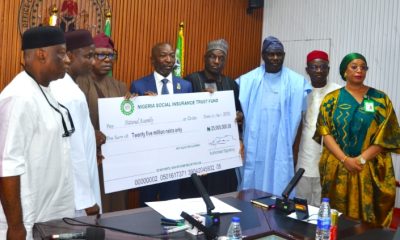
 News10 hours ago
News10 hours agoNSITF vows prompt payment of compensation, presents cheque to National Assembly staff
-

 News12 hours ago
News12 hours ago‘We Gave You Enough Time,’ Wike Orders Residents To Evacuate From Right Of Way
-

 Politics16 hours ago
Politics16 hours agoEl-Rufai: Mass defection from APC Looming
-

 News15 hours ago
News15 hours agoAbomination ! “I’ve forgiven my wife for sleeping with other men”, says Ijoba Lande
-

 Entertainment18 hours ago
Entertainment18 hours agoPraying five times daily made me dump Islam initially— Actress Habibat
-
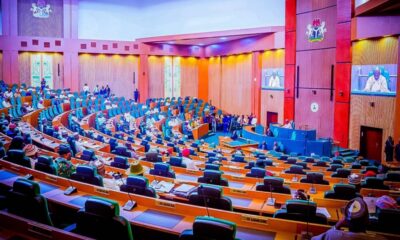
 News16 hours ago
News16 hours agoReps Commend Governor Okpebholo Over Improved Insecurity
-
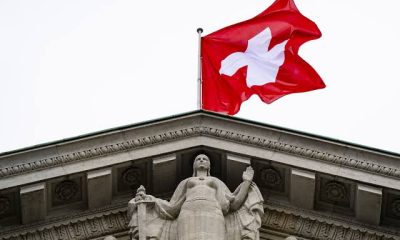
 News23 hours ago
News23 hours agoPanic grips international staff in Geneva as the 80-year old multilateral liberal order begins to crumble






